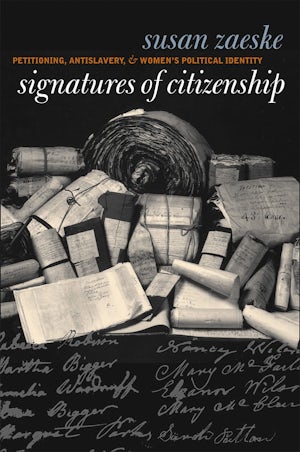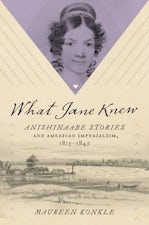Signatures of Citizenship
Petitioning, Antislavery, and Women's Political Identity
By Susan Zaeske
272 pp., 6.125 x 9.25, 13 illus., notes, bibl., index
-
Paperback ISBN: 978-0-8078-5426-6
Published: March 2003 -
E-book EPUB ISBN: 978-0-8078-6328-2
Published: December 2003 -
E-book PDF ISBN: 979-8-8908-7171-8
Published: December 2003
Gender and American Culture
Buy this Book
- Paperback $42.50
- E-Book $29.99
For Professors:
Free E-Exam Copies
Awards & distinctions
2004 Winans-Wichelns Award, National Communications Association
By analyzing the language of women's antislavery petitions, speeches calling women to petition, congressional debates, and public reaction to women's petitions from 1831 to 1865, Zaeske reconstructs and interprets debates over the meaning of female citizenship. At the beginning of their political campaign in 1835 women tended to disavow the political nature of their petitioning, but by the 1840s they routinely asserted women's right to make political demands of their representatives. This rhetorical change, from a tone of humility to one of insistence, reflected an ongoing transformation in the political identity of petition signers, as they came to view themselves not as subjects but as citizens. Having encouraged women's involvement in national politics, women's antislavery petitioning created an appetite for further political participation that spurred countless women after the Civil War and during the first decades of the twentieth century to promote causes such as temperance, anti-lynching laws, and woman suffrage.
About the Author
Susan Zaeske is associate professor of rhetoric at the University of Wisconsin-Madison.
For more information about Susan Zaeske, visit
the
Author
Page.
Reviews
"[An] incisive examination."--National Women's Studies Association Journal
"Invaluable to scholars of political culture. . . . Elucidates new aspects of women's political consciousness in the nineteenth century."--Historian
"Build[s] on the insights of pioneering historians . . . while also adding significantly to the findings of recent historians."--Journal of American History
"An admirable study of a significant activity in the history of 19th century reform movements."--Civil War Book Review
"A compelling portrait of the anti-slavery petition campaigns of the nineteenth century and their impact on women's political identities. Zaeske convincingly demonstrates that women's participation in the petition drives both contributed to the success of abolition and transformed women's political identity from one rooted in localities and religious duty to one of national citizenship and natural rights."--Civil War History
"Comprehensive. . . . This is a solid contribution and should be an essential read for anyone interested in ideas of citizenship and history."--Journal of Church and State




